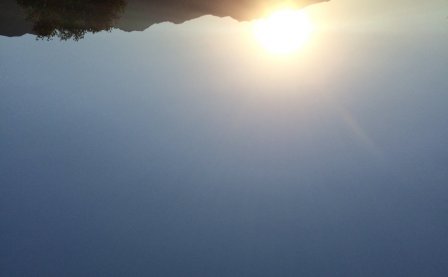I nearly missed my Mindflight. Filter sweeps and shimmering synthesizers whirled all around me, disorienting me with waves of earnest spirituality. I tried to trace the pattern. It eluded me as a kaleidoscope. No matter how hard I tried to break through, grab on, find a starting point, it evaded me. Deeper down still. Closer and closer I peered in, but it seemed to spawn only further fractals. Any two points in a song were totally identical, a mesh of links spreading out in all directions. I searched for melodies, a progression, a change, to no avail. Eventually I had to give up. It persisted, but my focus could not. I slipped into a state of passive listening, and it washed over me. Emeralds and water fountains in my mental image. Rooms opening up, doors slipping through. I boarded.
Matthewdavid’s Mindflight offers a different kind of listening, one to which I’m a little accustomed, but still rather hesitant to accept outright. These songs exist, statically, in a state I suppose you could call “the mind flight” for over 10 minutes at a time, stubbornly immaculate environments whose initial gorgeousness — fully electronic, beautifully rendered aural territories, with interwoven, panning arpeggios, ping-ponging animal coos, and blurred bass swelling and phasing beneath — is eventually beset by a curious fatigue. It puts you in a state of mild trance, whether or not you really want it to, by utterly burying you (with low-pass filters) in an endless and dense environment of sweet soundscapes, baked to warm tape perfection. Sounds that, while pleasant to listen to, are so illusory and devoid of any discernible progression that it becomes a kind of “soft noise,” so loose and incoherent it dissuades you from trying to hear it, defocuses you. If listening to harsh noise music might be compared to the catharsis of ripping off a band-aid, Trust The Guide and Glide stands opposite, a pure dulling of pain, a mess of colorful but meaninglessly busy psychedelia that absorbs and dissipates its listeners’ thoughts like drowning them in a vat of narcotic syrup.
Mindflight appears to be the conceptual culmination of Matthewdavid’s interests in “new age music,” a vague and reductive misnomer for certain subsets of experimental music that for decades now has conjured an oddly specific image of kooky, store-bought spirituality, appropriated pretensions and the sort of easy listening records that are sold at big box stores and come adorned with generic nature photography. “New age” is often associated with a certain atmosphere, a kind of stiflingly serene tone palette, mostly soft and placating, like the woodwinds of superstar composer Kitaro, but the rather under-appreciated genre tag (maybe less so since I Am The Center, thankfully) actually refers to a huge plethora of styles, methodologies, and different philosophies in music making, most of which either share commonality in a spiritual/quasi-religious connection or are conceived as musical mental tools, records intended to create inspiration, relaxation, or healing.
For Matthewdavid, it’s a bit of both worlds. Trust The Guide and Glide splits the difference between a phenomenological exploration of modular sound — it brokers a discreetly new and fairly effective method of peaceful mental disorientation — and making “new age music” as a spiritual embrace of oneself, arguing in the end that the precise application of parameters might approximate or maybe even create a full-on spiritual experience, if one is willing to seek it.
Although I initially felt tempted to write off this material as underdeveloped, I had to acknowledge as I listened that the album’s goals and my own in listening diverted wildly. I thought I would get simple, refined pleasures in small doses at a time, but Trust The Guide and Glide looks at music with a vast, aeonic scope, sees tone and timbre as representational, eternal, as if signifying qualia. There is a disarming completeness in all these songs that emerges through their ouroboric design, a resolute occupation of their respective territories that transforms them beyond the point of smaller notions, a living body of interwoven saws and harmonious sines. Songs grow as a cohesive climate of sound, identical waves of sonar coursing out and rendering their terrains in sparkling detail, like “Ocean Dream Symphony,” putting seagull calls and ocean spray into a bright body of blue and gold synths that swell and crest like the tide.
Or take “Venusian Sunset” and its simmering red beams of light, or “Love Harp” and its intimate slow burn, or closer “The Vessel And The Voyage,” a choppy, churning 22-minute epic that presses on against endless emerald storms, a glimpse of life on a boat from the middle of a long, long journey. Although they do little to engage the conscious, melody-inclined mind, these tracks are so wholly committed to embodying their specific environments that, by contrast, a distinct chord change would almost feel like a physical intrusion on undisturbed soil.
As to their healing effects, I guess that depends on your perception. I will say this: more than almost any other record that comes to mind at the moment, when I play this one at home, these worlds deliver a crushing ambience that defeats the stir of my errant thoughts, overwhelms me with unyielding energy, and renders me mute, possibly a bit zen.
This record robs me of care. I coast when I listen.
The Mindflight keeps flying when it gets dark, after I debark, on currents of air that never end.
When living beings witness the end of a kalpa
and all is consumed in a great fire,
this, my land, remains safe and tranquil,
constantly filled with heavenly and human beings.
The halls and pavilions in its gardens and groves
are adorned with various kinds of gems.
Jeweled trees abound in flowers and fruit
where living beings enjoy themselves at ease.
The gods strike heavenly drums,
constantly making many kinds of music.
More about: Matthewdavid, Matthewdavid's Mindflight, Mindflight




